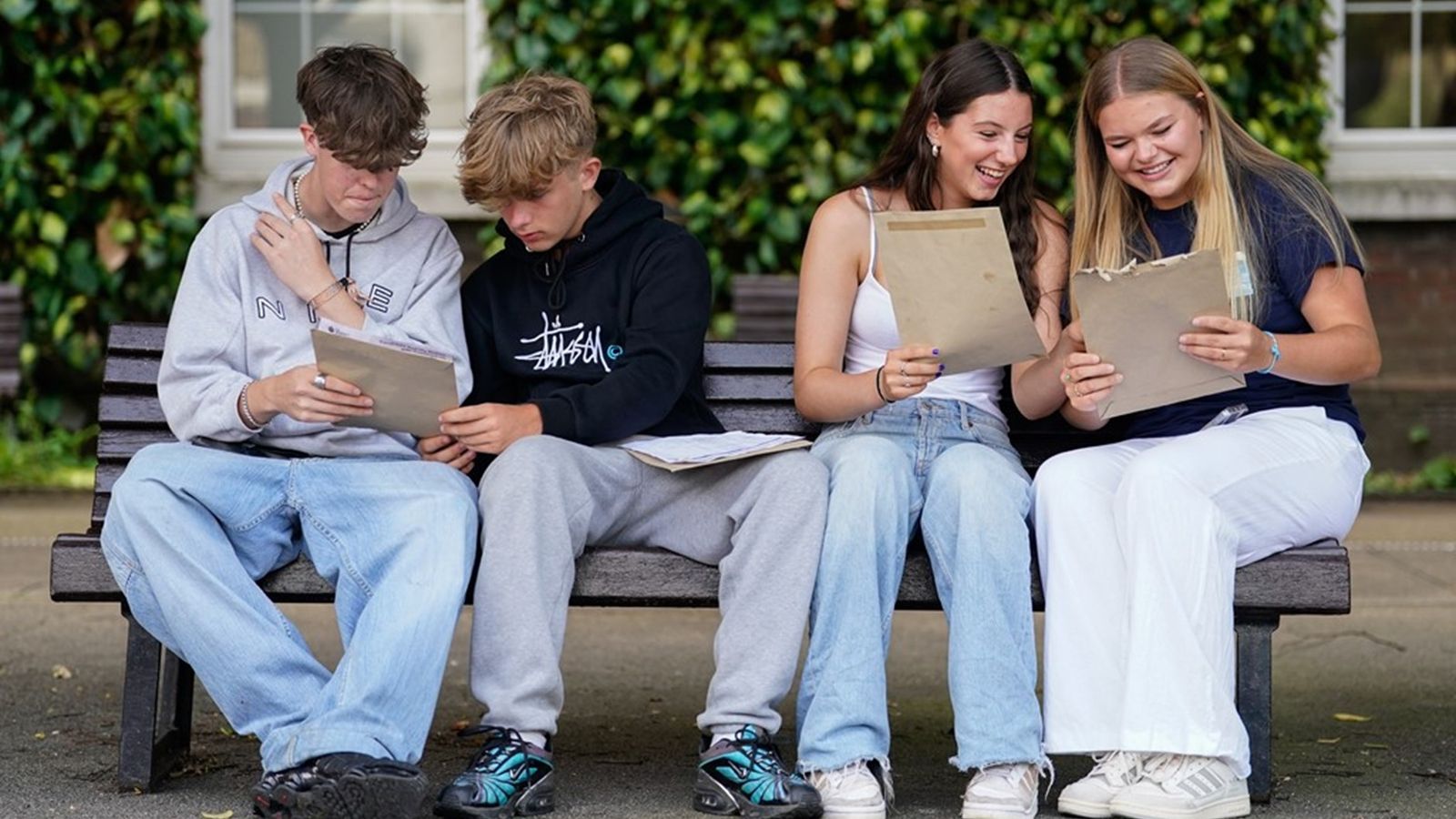As exam season approaches, some parents are putting hundreds of pounds aside to reward their children if they achieve certain grades.

Students recieve their GCSE results in Hampshire last August. Pic: PA
While some parents lambasted the idea as “absolute potatoes”, others told Sky News they saw their children’s focus increase after offering up to £250 for the top results.
Among them was Sarah Cook, 45, from Dorset, who said cash incentives had improved her eldest daughter’s concentration at GCSEs and she promised her youngest, Merryn, the same offer: £100 for a 9, 8 or 7 (A*/A in old money), £50 for a 6 or 5 (B) or £20 for a 4 (C).

Cath Lowther. Pic: Association of Educational Psychologists
“We were definitely all for it and happy to pay up based on achievement. I think it reflects real life as well – if you do well in your job, you tend to get paid more,” Ms Cook said.
Merryn, 13, added: “I think it is better for the motivation and for that extra encouragement to get the highest you possibly can and to push yourself more.”
Robert Gidney, from Norfolk, said his 14-year-old son’s results had improved by a grade since the family decided on reward money: £250 for a grade 9, reduced by £50 for each lower grade, with no reward for grades below 5.

Pic: iStock
“He seems to be concentrating a lot more on it. He has been studying a lot more and putting a lot more effort in.”
He admitted the practice might not be for everyone – something mother of two Sarah Paterson, 57, from Cheshire, would agree with.
“Never in a million years,” she said, recalling how her children, now aged 26 and 37, would protest that their friends were being offered cash rewards.
“It’s absolute potatoes. What are you setting you kids up for there?
“If they are going to academic, they are going to be academic. Life is about self-motivation.”
What the psychologists say
External motivators like money can help children focus in the short term, but they “eventually kill off intrinsic motivation”, said Dr Cath Lowther, general secretary of the Association of Educational Psychologists.
She said all children were intrinsically interested in learning, but regular external incentives “erode the engines of motivation” that cause them to find joy in learning or set and achieve their own goals.
It could also cause conflict and jealousy in some schools, with “children in that classroom who can’t afford breakfast”.
There is already too much pressure on children, said Dr Emma Citron, consultant clinical psychologist and chartered member of the British Psychological Society.
They are already trying to catch up after the pandemic and taking exams that could determine if they get a university place, she said.
“I just think that it’s sending all the wrong messages as parents. You’re adding to their pressure and actually, more importantly, changing the dynamic between you and your children.
Period pains causing ‘one in three’ girls to miss school
Funded childcare rollout branded ‘really ambitious game’
Student loses legal challenge against school
“You’re making it conditional on outcome, on reward, rather than what we know to be good, which is unconditional approval and validation.”
Parents ought to be “quietly supportive” and act in a pastoral capacity, she said.
Teachers split on the practice
Charlotte, a biology teacher at a private school, who did not wish to give her last name, said approximately 20% of a given year group were offered cash incentives by their parents.
The educator of 30 years said those children often found academia harder, misbehaved or hadn’t put in much work before exam season.
“It’s not that much fun, revising, it’s pretty dull, so I think anything that is an incentive is probably a good thing.”
She said her children, now adults, were not offered cash, adding they had dyslexia and dyspraxia.
“They knew that what we required was just for them to do their best,” she said.
A 26-year-old teacher at a state school in Reading said she hadn’t found cash incentives were common during her four years as a teacher, but she was offered money by her parents when she took exams.
“I think sometimes it could be effective, but it could put more pressure on the pupil and I don’t know if it’s healthy,” said the teacher, who did not wish to be named.
“They are going to feel disappointed if they don’t get the grades no matter what.”
Dr Lowther said cash incentives spoke to a wider problem with the British schooling system, where external motivators are built in from the start, rather than practices that foster intrinsic motivators like autonomy and connection to others.
From gold stars at reception to narrow choices in the national curriculum, schools focus on extrinsic incentives, she said.
“It would be great if there could be some real thinking about the curriculum and getting science behind how it’s developed and how it’s implemented,” she said.
News Related-
Up to 40 Tory MPs ‘set to rebel’ if Sunak’s Rwanda plan doesn’t override ECHR
-
Country diary: A tale of three churches
-
Sunak woos business elite with royal welcome – but they seek certainty
-
Neil Robertson shocked by bad results but has a plan to turn things round
-
Tottenham interested in move to sign “fearless” £20m defender in January
-
Bill payers to stump up cost of £100m water usage campaign
-
Soccer-Venue renamed 'Christine Sinclair Place' for Canada soccer great's final game
-
Phil Taylor makes his pick for 2024 World Darts Championship winner
-
Soccer-Howe aims to boost Newcastle's momentum in PSG clash
-
Hamilton heads for hibernation with a word of warning
-
Carolina Panthers fire head coach Frank Reich after 1-10 start to the season
-
This exercise is critical for golfers. 4 tips to doing it right
-
One in three households with children 'will struggle to afford Christmas'
-
Biden apologised to Palestinian-Americans for questioning Gaza death toll, says report
